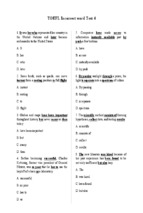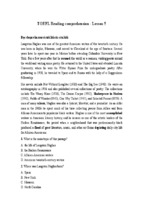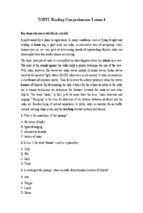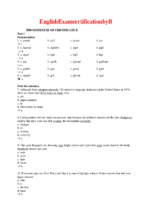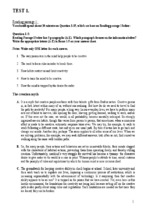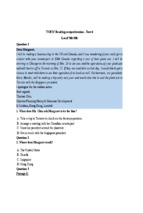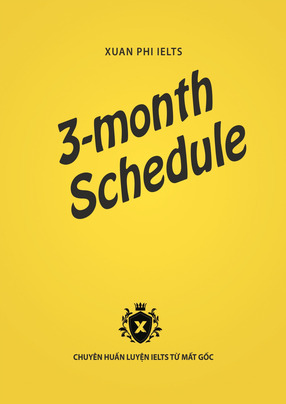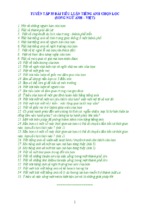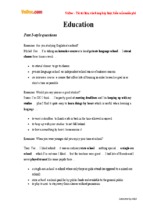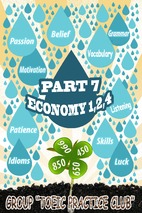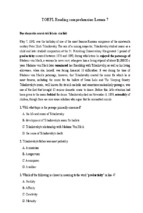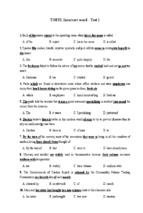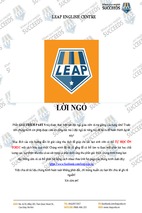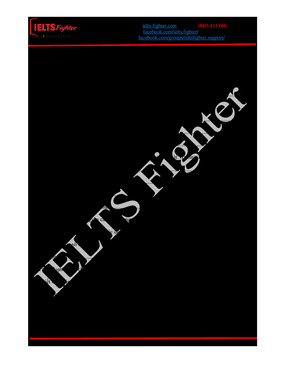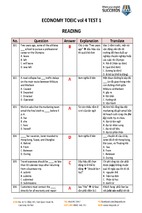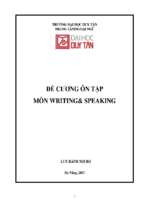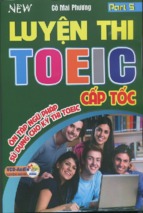Exam practice
Reporting
19
Listening Part 4
CR You will hear five short extracts in which people are talking about moving from the countryside to the
city. While you listen you must complete both tasks.
TASK ONE
For questions 1 -5, choose from the list (A - H) the reason each speaker gives for leaving the countryside.
1
Speaker 2
2
limited cultural activities
Speaker 3
3
Speaker 4
4
transport problems
F
Speaker 1
lack of privacy
C
slow broadband connection
close friends had left
A
Speaker 5
5
difficult to find a job
poor housing quality
limited shopping opportunities
TASK TWO
For questions 6 - 10, choose from the list (A - H) what each speaker says about their experience of living
in the city.
6
Speaker 2
7
satisfied with accommodation
Speaker 3
8
Speaker 4
9
grateful for a reliable income
F
Speaker 1
glad to have a hospital nearby
C
happy to have efficient transport
relieved to make friends
A
Speakers
10
enjoying a variety of places to eat
pleased with sports facilities
excited by diversity of cultures
139
Context listening
nal You are going to listen to two college friends talking about adventure holidays. What activities are
shown in these pictures?
-r
1.•
EI21 Listen to the conversation. Which of these items does Alison advise Ben to take with him?
air tanks for scuba diving
cooking equipment for camping
a face mask
insect repellent
leather trainers
a life jacket
plastic trainers
a sleeping bag
a snorkel
a sun hat
a tent
Ey MT Listen again. Change these sentences to show exactly what Alison or Ben said.
one
1 I went for the adventtife-lielifley based in Brisbane.
2
One of the local organisers met me at the airport.
3 They should provide all the equipment.
4
But you don't have to be a very good swimmer.
5 Preferably plastic trainers.
6
By the end of the holiday I was exhausted, but I was very fit!
7 You'll certainly need some insect repellent.
8 I don't imagine you'll need to take a tent and cooking things.
140
Substitution and ellipsis
20
Grammar
Substitution: one/ones
START POI .
They do diving holidays in quite a few places. I went for the one based in Brisbane. (one = diving holiday; one
replaces a singular countable noun or a noun phrase)
Take a couple of pairs of old trainers - preferably plastic ones. (ones = trainers; ones replaces a plural noun)
We don't usually use one/ones:
to replace an uncountable noun. Instead we use some
Don't forget insect repellent You'll certainly need some (not... need-one)
to talk about a specific item. Compare
Do you know anyone who's got a sleeping bag? I was hoping to borrow one
Have you still got your sleeping bag? Can I borrow it? (= a particular sleeping bag)
after the, unless it follows an adjective:
'Are these your trainers?' 'No, the leather ones are mine!
or unless there is a descriptive phrase after one/ones:
They had a number of adventure holidays on offer; and I chose the one that was cheapest.
I went for the one based in Brisbane.
after a possessive adjective (e.g. my). Instead we prefer a possessive pronoun (e.g. mine) or a phrase with
an adjective
You can borrow mine. orYou can borrow my old one rather than You can borrow my one.
However, one/ones is sometimes used after a possessive adjective in informal speech.
We don't usually use ones on its own to replace a noun phrase. Compare:
'You'll need trainers! 'Okay, I'll bring some: orTll bring some old ones: (not144-bring-ertes.)
We can either include or leave out one/ones after which, whichever; superlatives; either, neither, another, each (but
not every); the first/second/last; the other; this, that, these, those; and often after colour adjectives:
7 can't decide whether to go on the adventure holiday to Thailand or Australia! 'I'm sure you'll enjoy whichever
(one )you go on:
Get your own face mask. Buy the best (one )you can afford.
I've had three holidays with Trans World Adventures, but the first (one)was the best.
I've got these two sleeping bags, but this (one)is rather dirty. (these ones and those ones are only used in
informal speech)
We had two small boats to practise sailing in. One was green and the other (one)was red. I used to sail in the
green (one)
141
20
Substitution and ellipsis
al Substitution: so + auxiliary verb + subject; neither, nor, not ... either
'Was diving as difficult as you expected?' Perhaps even more so.' (so = difficult; replaces an adjective)
Trans World Adventures provides all the equipment - at least! presume so. (so = TransWorld Adventures
provides all the equipment; replaces a clause)
We can use so instead of a clause after certain verbs to do with opinions (e.g. expect, suppose, think), but not
after others (e.g. accept, know, be sure, hear):
Will I be met at the airport?"I expect so.'
'The monies are really bad at that time of year."I've heard that, too: (not Poe-heard-sort-Ise)
Some verbs are commonly used before not or in not... so in short, negative replies:
You won't need a sleeping bag if it's really hot: 'I suppose not: or 'No, I don't suppose so:
Other verbs like this include appear, seem; believe, expect, imagine, think. (With the last four verbs we prefer
not ... so in informal contexts):
'Do you think I'll need to take a tent?' I don't imagine so: or formally '! imagine not'
Before not we can use be afraid (= showing regret), assume, guess, hope, presume, suspect
'Do they offer any holidays in Africa?' I'm afraid not: (not Vol-ftet-afraid-50;
We can use so + auxiliary verb + subject to say that a second person does the same thing as a person already
mentioned. In the negative we use neither, nor or not ... either
'I'd like to go to Tasmania,' So would I.'
'I'm not really a very good swimmer: 'No, neither am I. or 'Nor am I: or 'I'm not either.' or 'I'm not a very good
swimmer either.'
BEI Substitution: do so
We can use a form of do so to replace a verb and the word or phrase that follows it to complete its meaning
When asked whether they intended to offer holidays in Africa, Trans World Adventures said they had no plans to
do so. (do so = offer holidays in Africa)
He planned to go to Australia this year, but now that he has lost his job he has little chance of doing so. (doing so =
going to Australia)
We can use do so where the verb describes an action, but avoid it with verbs that describe states and habitual
actions:
We went down the river by boat, and saw a lot of wildlife while doing so
Some people didn't enjoy the hard work, but I did. (not but-l-did-so
Less formally, we use do it or do that with a similar meaning
We put up our tents by the side of the river. We did that at about four o'clock every afternoon. or formally
We did so ...
We use do (rather than do so) in informal English, especially after modals or perfect tenses (but note that we can
often leave it out):
'Do they provide all the equipmentr 'They should (do):
'Could you have gone to Thailand instead?"Yes, I could have (done):
142
Substitution and ellipsis
20
2.4 Ellipsis: leaving out words after auxiliary verbs and after to
'Have you decided yet?"Yes, I have: (= Yes, I have decided.)
A lot of people go to the Great Barrier Reef when they're in Australia. Were you able to? (-= Were you able to go
to the Great Barrier Reef?)
We often leave out or change verbs to avoid repeating them.
We can sometimes use to instead of a clause beginning with a to-infinitive when it is clear what we are
talking about:
I'd certainly like to go back to Australia. I hope to next year. (= to go back to Australia)
We can use to or leave it out:
after certain verbs (e.g. agree, promise, start):
I want to read a lot about Australia before I go. I've started (to)already.
after most nouns (e.g. idea, opportunity) and adjectives (e.g. frightened, willing) that can be followed by a
to-infinitive clause
I've always wanted to go, but I've never had the chance (to)before.
I hope they don't ask us to swim f there are sharks around. I'd be afraid (to)
after want and would like in if-clauses and wh-clauses:
We must talk about it more. You can come over whenever you'd like (to)
We don't use to after like
You can come over whenever you like.
We have to use to:
after verbs (e.g. expect, mean, need) which must have a complement:
You can borrow mine if you need to.
after a negative
You don't have to sail on your own if you don't want to.
When have (got) is a main verb in the first clause or sentence, we can often use either have (got) or do to avoid
repetition in the following clause or sentence:
Have you got a sleeping bag? I'm sure you have. (= I'm sure you have got a sleeping bag.) or I'm sure you do.
(= I'm sure you do have a sleeping bag.)
When have is followed by a noun to describe an action (e.g. have a shower, have a shave, have a good time)
we usually use do:
I wasn't really expecting to have a good time, but I did.
143
20
Substitution and ellipsis
Grammar exercises
M Read the underlined pans of these dialogues. Cross out the words which can be left out.
1 k What was wrong with Sue?
B: She was frightened, or at least she appeared to be frightened
2
A: You should have asked me. I could have given you a lift into town.
B: Thanks, butt didn't like to ask you. I know how busy you are.
3
k. Has Sarah eaten anything today?
B: No, I don't think she has eaten anything today.
4
A: My grandmother would have been shocked by all the changes in the village.
B: Yes, I'm sure she would have been shocked.
5
A: Don't forget we're going out tonight. Can you leave work early?
B: Okay, I'll try to leave work early.
6
k We could get to the island across the new bridge.
B: But it hasn't been opened yet.
A: I thought it had been opened.
7
A: I hope I get promoted this time.
B: You certainly deserve to get promoted. You work really hard.
8
k I didn't know you were getting married.
B: Sorry. I thought you did know I was getting married.
MI Replace the underlined word(s) with one or ones where possible. If it is possible to omit one or ones,
put the words in brackets.
1
k Do you want one of these sweets?
(ones)
B: Are there any green sweets left?
A: No, they've all gone.
2
A: It's about time we got some new curtains.
B: Okay, well, let's go out and buy some new curtains.
3
A: I know it's muddy outside, but shall we go out for a walk?
13: But I haven't got any boots.
A: You can wear my old bolgs.
4
k To get to your house, do I take the first or second turning?
B: You can take either win.
5
A: Why did you buy those green apples?
B: They were the cheapest apples I could find.
144
Substitution and ellipsis
6
20
Have you seen the car keys? I can't find the car kevs anywhere.
7 That mirror is like the mirror my parents have got in their sitting mom.
8 This glass has got a crack in it. Have you got another gjus?
9
I dropped my brother's mobile phone and had to buy him a new mobile_ohone.
10 We've got chocolate biscuits or these biscuits. Which biscuits would you prefer?
gm Complete the sentences where possible with so, do, do so or so do, using an appropriate form of do.
If it is not possible, suggest an alternative.
1 She stood up slowly, and was obviously in pain as she
2
eta
so
A: Miller played really badly, didn't he?
B: But
the rest of the team.
3 A: Are you going to Spain again for your holidays?
B: I might
. I haven't decided yet.
4
Louise will be meeting us at the airport. At least, I hope
5
A: Apparently, Harun's dropped out of college.
B: Yes, I'd heard
too.
6 We do more or less the same job, but he earns much more than I
7
A: We can take a shortcut if we wade across the stream.
B: What's the point of
? The bridge isn't far.
8 He has yet to win a tournament, but he came close to
9
in Monaco.
A: Do you really think she'll lend you the money?
B: I'm sure
10 Megan loves horse riding, and
Victor.
145
20
Substitution and ellipsis
3.4 Improve this email by editing the underlined parts to avoid repetition.
Hi Chris,
I tried phoning you earlier, but you must have been out. But I just
have to tell somebody about the terrible day I've had: - ( !
It started badly and got worse! When I got up the kitchen was
flooded — I'd left the freezer door open! I've never (1) left the
freezer door open before. By the time I'd finished mopping up all
the water it was getting late. I was going to take my big handbag
to work, but I was so rushed I picked up my (2) small handbag
by mistake, leaving my purse behind so I didn't have any money.
Luckily, I bumped into Bob at the station and he was able to lend
me (3) some money. My office key was also still at home, so when
I got to work! had borrow (4) an office key.
Then! had to get to an important meeting. Our company is hoping
to do some business with a Japanese firm. My boss thinks we have
a good chance of signing a deal soon, but I don't think (5) we have
a good chance of signing a deal soon. I thought the meeting was on
the fourth floor — in fact,! was certain (6) it was on the fourth floor.
But it had been rearranged and nobody had bothered to tell me.
So! was 20 minutes late. I wasn't very happy, and (7) my boss
wasn't very barmy either. To make matters worse, I'd been hoping
to run through my presentation over breakfast, but I'd had no
(8) Lime to run through my presentation over breakfast. So my talk
went really badly. Afterwards, my boss said she was disappointed
with the way the meeting went. But (9)J was disappointed with the
way the meeting went, too.
After such a dreadful day, I was hoping I'd have a quiet evening,
but! (10) didn't have a quiet evening. When I got home! found
that my cat had knocked over some glasses — you remember the
beautiful old Swedish (11) glasses that my parents gave me? I
wonder if I'll be able to replace them? I (12) don't expect I'll be
able to replace them.
The only good thing is that it's the weekend. Come over whenever
r. In fact, are you able to come over
you (13) want to
tomorrow? If you (14) 're not able to come over tomorrow how
about Sunday? Or are you still too busy decorating the house?!
(15) hope you're not too busy decorating the house. But give me a
call and let me know.
Love,
Beth x
146
done that
Exam practice
Substitution and ellipsis
20
Listening Part 3
You will hear part of a radio interview in which David Evans, a chef in a British school, is talking about
his work. For questions 1 -6, choose the answer (A, B, C or D) which fits best according to what you hear.
1
What was the students' initial reaction to the food they were served?
A They didn't like being the subjects of an experiment.
They would rather have eaten traditional British food.
C They were not sure whether it was good or bad.
They felt that it was an adventure for them.
2
According to David, why do some students have difficulty in accepting the 'restaurant system'?
A They are uncomfortable eating meals with adults.
They are not used to having meals with others.
C They don't like talking about food.
They have to waft too long to be served.
3
What main role do the staff play in the school restaurant?
A They check that students are eating their meals.
They find out about the students' home lives.
C They deal with students' complaints about the food.
They help students find out about a balanced diet.
4
According to David, where does most of the food served in the restaurant come from?
A anywhere that can provide fresh ingredients
the school grounds
C all over the world
suppliers close to the school
5
In David's view, which of his previous jobs prepared him best for his work as a school chef?
A
teacher
manager
C waiter
cook
6
Why does David think that his approach could be difficult to introduce in other schools?
A Students tend to be resistant to change.
Not all students see healthy eating as important.
C Other schools don't see healthy eating as a priority.
Parents would be unwilling to accept it.
147
Word order and emphasis
Fronting; cleft sentences; inversion; inversion in conditional
sentences
Context listening
En Which of these qualities and characteristics might people use in describing you?
commitment confidence dedication enthusiasm loyalty modesty
determined efficient
persuasive reliable
energetic patient
Eis
02T Listen to this speech made in honour of Maria Adams, a music teacher. Which of the qualities
and characteristics in 1.1 does the speaker use to describe her?
fl1:12T Listen again and say whether these sentences are true (T) or false (F). If a sentence is false,
say why.
1 Maria was a violinist before she became a conductor.
In the Musk in Schools
2
T
project the council gives children musical instruments.
3 Musicians are not paid to take part in the Musk in Schools project.
4 Children in city schools now have to pay for their music lessons.
Maria helps children go to other countries to play music
5
1.4 1132/ These ideas are expressed in a different way by the speaker. Listen again and write down
exactly what he said.
1 We first met in the mid-1990s.
It was in the ma-1990's that we first met.
2
She sees making music as a fundamental part of a child's development.
3 The way she calmly and clearly argued her case impressed us most.
4
I have rarely met anyone with such passion for their beliefs.
5
The council has tried to make changes to the Music in Schools project a number of times in order to save money.
6
The council backed down only after Maria threatened to withdraw her support from the project.
What difference do you notice between the sentences given and the ones you have written in 1.4?
148
Word order and emphasis
21
Grammar
EU Fronting
We can emphasise a particular part of a sentence by moving it to the front of the sentence, changing the usual
word order
She sees making music as a fundamental part of a child's development. -'Making music she sees as a
fundamental part of a child's development. (fronting of object)
She resisted this.
This she resisted. (fronting of object)
Maria had been writing to me for some weeks. For some weeks Maria had been writing to me. (fronting of
adverbial)
EH Cleft sentences
atrit47
It's among children from poorer backgrounds that the Music in Schools project has had most impact.
(emphasising among children from poorer backgrounds)
What impressed us most was the way she calmly and clearly argued her case. (emphasising the way she calmly
and clearly argued her case)
An it-cleft has the structure it + is/was + emphasised part + relative clause. The relative pronoun can be that,
which, who or no relative pronoun. When and where are used only in informal English:
It was in the mid-1990s that we first met, or informally ... when we first met.
A sentence with a wh-deft usually has the structure what-clause + is/was + emphasised part. Sometimes we use
all instead of what
What she was suggesting was that members of the YCO would volunteer their services.
All she ever wanted to do as she was growing up was play the violin. (= the only thing she ever wanted to do)
After the what-clause we usually use a singular form of be fn or was). However, informally, a plural form (are or
were) is sometimes used before a plural noun:
What she hopes to see is/are children who enjoy a wide range of musical styles.
We can sometimes put a wh-cleft at the end of a sentence
The way she calmly and clearly argued her case was what impressed us most
The Music in Schools project is what came out of our meeting.
To emphasise an action we can use a wh-cleft with what + subject + form of do + form of be + (to) + infinitive:
What she did was (to)convince us of the value of a musical education.
BD Inversion
In front of the committee sat Maria.
(= verb + subject)
Seldom did she raise her voice.
(= do + subject + verb)
= inversion of normal word order
Never have I heard such a persuasive speaker (= auxiliary + subject + verb)
Word order is inverted after certain words and phrases when these are pu at the beginning of a sentence or
clause in order to emphasise them. This kind of inversion is found mainly in formal speech and writing.
149
21
Word order and emphasis
Inversion occurs after words and phrases with a 'negative' meaning
the negative adverbs never (before), rarely, seldom; barely/hardly/scarcely when/before; no sooner... than;
nowhere; neither, nor
Rarely have I met anyone with such enthusiasm.
No sooner had Maria walked through the door than she started to talk about her proposal.
hadn't met Maria before, and nor had the other members of the committee.
(See also Unit 17,2.3 for more on hardly, no sooner and scarcely.)
only + a time expression (e.g. after, later, then) or a prepositional phrase
Only after Maria threatened to withdraw her support did the council back down.
the prepositional phrases at no time, on no account, under/in no circumstances; in no way (or no way in
informal language):
At no time has she ever accepted payment for her educational work
She argued that under no circumstances should children from poorer backgrounds be made to pay for
music lessons.
expressions with not not only, not until, not since, not for one moment, not once, not a + noun:
Not only has she persuaded YCO members to give up their time, but she has also encouraged visiting
musicians to give free concerts in schools.
little with a negative meaning
Little did she realise when she set up the project that it would be so influential.
Inversion also occurs after:
time sequence adverbs such as first, next, now, then with be or come
And then came an invitation to be a special adviser to the government on music education.
If there is a comma (,) or an intonation break in speech after the adverb, normal word order is used:
Then, an invitation came from the government. (not Thenreamean-i9vitaben ...)
so + adjective ... that emphasising the adjective
So successful has Music in Schools been that those involved in music education around the world have visited
the city to see the project in action.
such + be ...that, emphasising the extent or degree of something
Such was her understanding of music education that the government wanted to draw on her expertise.
(= Her understanding of music education was such that ...)
2.4 Inversion in conditional sentences
In formal or literary English, we can use clauses beginning were, should and had, with inversion of subject and
verb, instead of a hypothetical conditional:
Were she ever to leave the orchestra, ... (= If she left ... or If she were to leave ...)
Were he here tonight, ... (= If he was/were here tonight...)
Should you need any more information about Music in Schools, ... (= If you need ...)
Had Maria not been around, ...(= If she had not been around ...)
In negative clauses with inversion, we don't use contracted forms:
Had Maria not set up the Music in Schools project ... (not Hadk-Nhafia-set-up ...)
ISO
Word order and emphasis
21
Grammar exercises
EEI Write a new sentence with a similar meaning to the original. Emphasise the information underlined
using an it-cleft or a wh-cleft at the beginning of the sentence. Sometimes both are possible.
1 I want you to hold the cat tightly while I out on this collar.
2
She announced she was going to join the air force at her 18th birthday party.
3
A: So how did you get the car out of the mud?
B: We asked a farmer to gull us out with his tractor.
4
k What do you thinks wrong with the car?
B: The battery could be flat.
5
This huge bunch of flowers arrived for me this morning. I don't know who sent them.
6
My parents must have given Wei my telephone number.
7
The research shows a link between salt intake and rates of heart disease.
8
His nervous laugh made me think he was lying.
1 IAMat I want you to do is hold. the, cat tightly while I pith on this uliar
eg Match the sentence halves. Write new sentences with a similar meaning starting Should ...,
Had ... or Were....
1 If you require further details,
a
she might have made a full recovery.
2
If today's match has to be postponed,
b
the insurance covers a full refund.
3
If anyone had been looking at Maria when
the police arrived,
c
please contact our public information
office.
4
If taxes were to be increased further,
d
there would be a huge public outcry.
5
If the doctors had operated sooner,
e
we would not have begun the climb.
6
If I were president,
I it will be replayed next week.
7
If your flight is cancelled,
g
8
If heavy snow had been forecast,
they would have noticed the expression
of panic on her face.
h I would introduce three-day weekends.
1+ c Should- you require further demus, please contact our publication information office.
2
3
4
5
6
7
8
151
21
Word order and emphasis
pp Complete the sentences with appropriate words. Use three words only in each sentence.
1 I thought the insurance policy would pay my hospital fees. At no time was I told, / was I Mfortned.,
that it did not cover skiing injuries.
2 Seldom
impressed indeed.
piano playing of such maturity from someone so young. I'm very
3 He felt someone bump against him on the crowded bus, but only later
wallet had been stolen.
that his
4 I found the old bracelet while I was walking along the beach. Little
had made one of the most important archaeological discoveries of recent years.
5 Not since Philip and Gary Neville last played in 2004
England football team.
then that I
two brothers in the
6 I asked her to describe her attacker, but only after several minutes
7
No sooner
me.
into bed than his flatmate started playing his drums.
8 The Atlantic crossing took eight days. I was in Isabella's company on several occasions, but not a word
to me until near the end of the journey.
3.4 Rewrite the underlined parts of the conversation, emphasising the word(s) in italics. In each case use
fronting, a cleft sentence or inversion.
I hear you and Anna didn't have a great holiday on the island.
No, not really, although (1) we liked the island a lot. (2) The hotel was the real problem.
Why? What was wrong with it?
Our room was just awful. The shower only had cold water and the air conditioning didn't work.
Didn't you complain?
Oh yes. Anna was pretty annoyed and went down to reception to complain. But they told her she
was just being fussy and (3) she got really furious about that. She insisted on seeing the manager, and
demanded that something should be done.
And was it?
Well, we had a steady stream of workers coming into the room after that. (4) An electrician camefirst
and then the next day a plumber. But neither of the problems got fixed. (5) It took them three claws to
decide that we needed another room.
You must have been fed up with the hotel by that time.
I think (6) the attitude of the staff annoyed me most - they really just didn't care. (7) I have never
seen such a total lack of interest from people who are supposed to be providing a service. (8) No one
avologised once the whole time we were there ...
the. island we liked, a tot
5
2
6
3
7
8
152
II
Exam practice
Word order and emphasis
21
Reading and Use of English Part 4
For questions 1 - 6, complete the second sentence so that it has a similar meaning to the first sentence,
using the word given. Do not change the word given. You must use between three and six words, including
the word given. Here is an example (0).
0
He always calls his house his 'castle'.
REFERS
He always refers to lus house as his 'castle'.
1
She was proud of her work, and she was also well respected by her colleagues.
TAKE
Not only
2
her work, she was also well respected by her colleagues.
She hated publicity so much that she never gave any interviews to the media.
HER
Such
3
of publicity, that she never gave any interviews to the media.
During her illness, she realised that the only choice she had was to take early retirement.
ALTERNATIVE
During her illness, she realised that there
4
to take early retirement.
I had only just complained about the new timetable when it was changed.
MADE
No sooner
5
about the new timetable than it was changed.
I'm sure she would do an excellent job if she ever became head of department.
WERE
head of department.
I'm sure she would do an excellent job
6
It is distinctly possible that I will get promoted in the near future.
OF
There is a
promoted in the near future.
153
Jo, give, have, make, take + noun
Context listenin
al You are going to listen to a radio news report. Look at the photos. What do you think the report
is about?
In DE Listen and check whether you were right. As you listen, number these events in the order
the reporter mentions them.
a
Two power stations were built dose to Lake Taal.
b
People were evacuated from around Lake Taal.
C
The Taal volcano erupted and around a hundred people were killed.
d Scientists found that the temperature of Lake Taal was increasing.
e
The Taal Emergency Strategy was introduced.
I A state of high alert was declared.
g
The Taal volcano erupted and over a thousand people were killed.
1
In OR Listen again. Complete each extract from the news report with a noun in the first space and
a preposition in the second.
1 The
breakdown
ui communication cost at least a hundred lives.
2
There has been an
3
The
without electricity.
4
There was also a dramatic
5
Their concerns increased with the
6
Two days ago the
the number of people living close to the lake.
the power stations would leave thousands of homes and businesses
the level of radon gas in the soil.
thousands of dead fish.
around 30,000 people began.
1.4 Write new sentences with similar meanings to those in 1.3. In each case, use a verb related to
the noun in the first space.
1 Communication broke down itnci this cost at Least a, hundred, lives.
154
Nominalisation
22
Grammar
Nominalisation
There has been an increase in the number of people living close to the lake. or The number of people living close
to the lake has increased.
The danger of the situation made it necessary to bring in the army to oversee operations. or The situation was
so dangerous that it was necessary to bring in the army to oversee operations.
We can sometimes use a noun or noun phrase for an idea usually expressed by a verb or adjective. This
process is referred to as nominalisation. It is especially common in formal styles of writing.
An adverb modifying a verb changes to an adjective in a nominalised form:
Scientists noticed a sudden rise in the temperature of the lake. or Scientists noticed that the temperature of the lake
had risen suddenly.
The main noun in a noun phrase is often followed by one or more prepositional phrases:
The industrial development of the area has increased the number of people living near the lake.
There was also a dramatic rise in the level of radon gas in the soil.
We use nominalisation for a number of reasons:
to avoid mentioning the agent (the person or thing that performs the action); for example, if we want to be
impersonal or to make the agent less important Compare
Two days ago the authorities began to evacuate 30,000 people. (agent = the authorities)
Two days ago the evacuation of around 30,000 people began. (no agent mentioned)
to express two clauses more concisely as one clause:
The building of two power stations just a few kilometres away was strongly criticised by environmentalists. or
Two power stations were built just a few kilometres away. This was strongly criticised by environmentalists.
to give a different focus to the sentence. Compare
The provision of temporary shelter in a safe location for those displaced is the army's top priority. (New,
important information is usually placed at the end of the sentence or dause. The focus here is on the army's
top priority.)
Temporary shelter in a safe location for those displaced is being provided, and this is the army's top priority.
(No particular focus: is being provided and the army's top priority are both in 'new information' position in
their clause.)
Ets Do, give, have, make, take + noun
We can sometimes use a form with do/give/have/make/take + noun instead of a verb:
The authorities took immediate action. or The authorities acted immediately.
The decision was made to evacuate the area. or It was decided to evacuate the area.
Often, the do/give/have/make/take + noun patterns are less formal than using a verb alone
When my mother was ill, I had to cook for the family. (more formal)
I had to do all the cooking last week because Mum was away. (less formal)
155
22
Nominalisation
Grammar exercises
En Rewrite the sentences to remove the agent. Use a nominalised form of the underlined verb and make
any other changes needed.
1The government released the prisoners unexpectedly.
2 They organised the conference very professionally.
3 Spectators turned out in huge numbers for the match.
4 The army withdrew the troops immediately.
5
We need to shake uD top management for the company to be successful again.
6 The banks increased interest rates for the third time in two months.
7 They agreed on extra funding for the project.
8 They decided to postpone the race at the last moment.
1 The release of the; prisoners was unexpected. / There was an unexpertea release of prisoners.
ElE1 Rewrite each sentence using a nominalised form at the beginning. Leave out the agent.
1 After scientists identified the HIV virus in the mid-1980s, there were enormous efforts to produce a vaccine.
The identirfication of the HIV virus in the mid-1980s Led, to / resultect in enormous efforts to
product ci vaccine.
2 Johan is obsessed with cars, and this started when he was quite young.
3
The government has expanded the nuclear power programme, but this has been criticised by opposition
politicians.
4 The petrol companies have reduced the price of petrol, which is good news for drivers.
5
The council abolished parking charges in the city centre, and as a result shops have reported increased
business.
6 Parent organisations are demanding healthier food in schools, and this results from growing concerns about
childhood obesity.
7
The train will depart half an hour late because of engine problems.
8 A new college principal has been appointed, and staff may leave as a consequence.
10
Nominalisation
22
Complete the extracts from newspaper articles using the information in the box. In each sentence,
use a nominalised form.
bsaluable-bee4es-have-disappeared
the English spelling system is complex
the damage to property is extensive
people have responded to its recruitment drive
people are strongly resisting increased taxation
the situation is threatening animal and plant species
1 Detectives were last night questioning a man about the, disappearance of a, number of vaitiabie books
from the National Library over recent months.
g
The teaching method we have developed acknowledges
guides children towards a better understanding in carefully controlled stages:
,and
3 The Health Service is hoping to appoint 480 new nurses. Last night the Health Minister said
was 'excellent; with 7,000 applications in two days.
4 Chinese remedies are rooted in 4,000 years of tradition, but growing Western interest in alternative
. Products confiscated by
medicines has increased
environmental officers included some using the seedpods of a rare orchid.
5 The extra public spending will need to be paid for and, with borrowing ruled out, that can only mean
, this could undermine the
putting up taxes. Given
government's chances of being re-elected.
Residents of the south coast are beginning to return to their homes after the recent severe flooding.
means that some will be living in temporary
However,
accommodation for many months.
3.4 Make these conversations more informal where possible, replacing the underlined parts with
appropriate dolgive/havelmakeltake + noun forms.
Have you (1) washed uo yet?
I've (2) started on it. But there's such a lot to do, and you know how much I hate it.
Well, I'm going outside to (3) work in the garden.
(4) Skutt if you need any help.
A: No, thanks. You just concentrate on the washing-up!
1 done the washing-tip
2
2
3
4
k Well, I've (S) decided. I'm going to apply for a job at Raggs.
B: Good for you. 1(6) feel you'd really get on there.
I've (7) arranged to see their head of personnel next Friday.
And how will you tell Terry you're thinking of leaving the company?
A: Well, it won't be easy, but I suppose I'll just have to (8) breathe deeply and (9) explain to him why
I want to go.
5
8
6
9
7
157
22
3
Nominalisation
A: Did you (10) talk with Natasha about the holiday?
B: Yes, 1(11) called last night and we (12) chatted about it then.
Az And how did she react when you said we weren't going with her?
B: She just (13) sighed and said 'That's okay: But she was obviously upset.
10
12
11
13
4
Al I'm exhausted. I'm going to (14) shower and (15) rest before we (16) rook.
B: I'm pretty tired, too. I'll (17) look at what's in the freezer, or maybe we could eat out?
14
16
15
17
f5 8
- Xem thêm -

